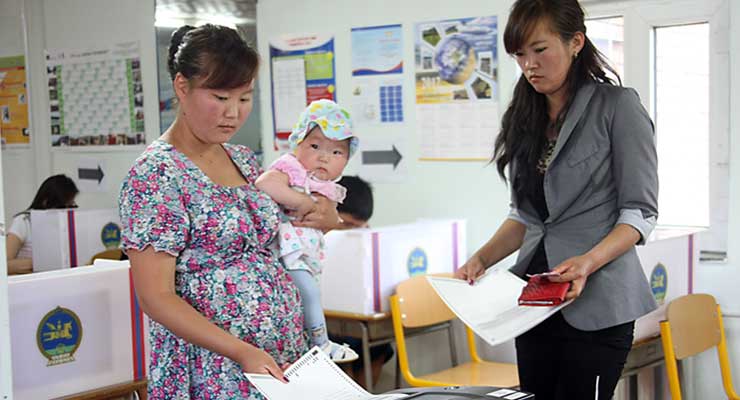
Conference examines role of reforms to police and security forces in balancing Mongolia democracy
Democracy, elections and voting at Democracy Chronicles
From an OSCE press release titled, “Mongolia hosts OSCE conference on the role of armed and security forces in democratic societies” after a conference in Ulaanbator, Mongolia:
A three-day conference, organized by the OSCE Conflict Prevention Centre, on the role of armed and security forces in democratic societies got underway today in the Mongolian capital, bringing together representatives from Central Asia and the OSCE’s Asian Partners for Co-operation.
Participating in the conference are some 50 high-ranking officials from the ministries of foreign affairs and defence, the armed forces, national parliaments and academia from 16 States to discuss the respect of international humanitarian law, security sector reform, rights of armed forces personnel and the parliamentary oversight of security forces.
“The tenets of Mongolia’s foreign and security policy are those of a free, democratic and peaceful nation fostering friendship and all-rounded cooperation in our neighbourhood and beyond,” said Lundeg Purevsuren, the Foreign Minister of Mongolia. “As a result of comprehensive and ongoing reform, the Armed Forces and the whole security sector, including law enforcement, are subject to firm civilian and democratic control. The OSCE guiding principles are thus in line with our own values and vital national interests.”
The OSCE Code of Conduct on Politico-Military Aspects of Security, adopted in 1994, is a landmark document for the governance of the security sector and the role of armed and security forces in democratic societies. It contains key principles and commitments for the 57 OSCE participating related to security relations between States but also to the control of all armed and security forces within a State. For example, States must also ensure that their armed forces remain politically neutral and respect human rights.
Tserendash Tsolmon, Mongolia’s Minister of Defence, said: “Mongolia is a nation with long-standing and glorious military tradition. It is a society where every youth is expected to become a good warrior. But the age-old wisdom was that to be a good warrior requires something much more than ability to fight. Perseverance, comradery, respect for dignity of other humans and help to those in need were as important facts in upbringing a real Mongolian soldier. Although the most recent participating State to join the Organization, the Mongolian defence establishment is eager to upgrade its co-operation in promoting the OSCE Code of Conduct, which we consider a document corresponding with our values and national interests.”
This conference was organized in co-operation with the Mongolian Ministries of Foreign Affairs and Defence and with the support from Austria, the Czech Republic, Germany, Liechtenstein and Switzerland.
It is the eighth regional seminar of its kind. Previous seminars took place in Serbia (2014), Malta (2013), Latvia (2012), Ukraine (2011), Belarus (2010), Bosnia and Herzegovina (2009) and Kazakhstan (2008).
The conference is held in line with a decision of the OSCE Forum for Security Co-operation (FSC) which requests the OSCE Secretariat to organize annually at least one specialized seminar or workshop in order to facilitate better implementation, to promote awareness on and to support outreach of the Code of Conduct.
Daniel Penisten (aka: Dan 1, Scolos Narbarson) says
It is good to see this Democratic activity in Mongolia…one of my favorite places in the world. mongols are keenly interested in the way things are going in the world around them. I hope that they will be respected and not mistreated by the blossoming powers to their North and South.
The article states that: “…States must also ensure that their armed forces remain politically neutral and respect human rights.”
I can see where this is a great ideal and worthy of achievement, but how can this be done? Armed Forces are made from Individuals that have political opinions…Can they be “trained” and/or “motivated” to be neutral? And is this achieved through keeping focused on their state’s defense? What would be the nature and methods of this kind of Neutrality Training”? Would just ordering the soldiers to be neutral, be sufficient to this goal?